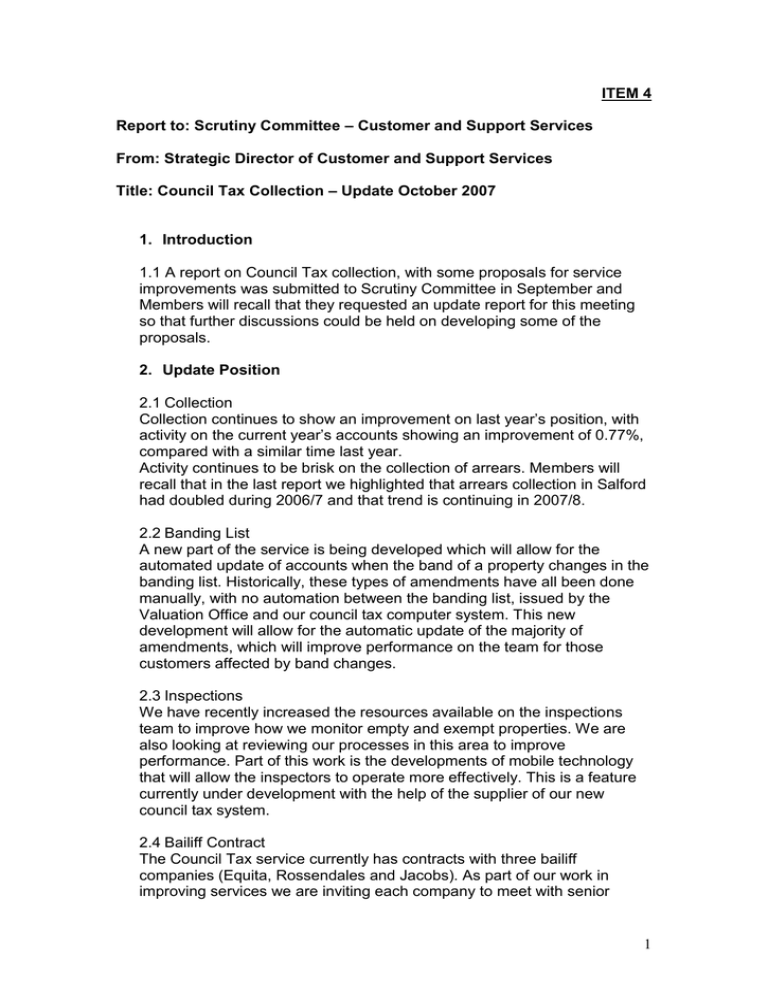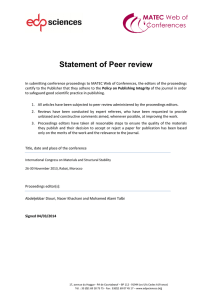ITEM 4 – Customer and Support Services Report to: Scrutiny Committee
advertisement

ITEM 4 Report to: Scrutiny Committee – Customer and Support Services From: Strategic Director of Customer and Support Services Title: Council Tax Collection – Update October 2007 1. Introduction 1.1 A report on Council Tax collection, with some proposals for service improvements was submitted to Scrutiny Committee in September and Members will recall that they requested an update report for this meeting so that further discussions could be held on developing some of the proposals. 2. Update Position 2.1 Collection Collection continues to show an improvement on last year’s position, with activity on the current year’s accounts showing an improvement of 0.77%, compared with a similar time last year. Activity continues to be brisk on the collection of arrears. Members will recall that in the last report we highlighted that arrears collection in Salford had doubled during 2006/7 and that trend is continuing in 2007/8. 2.2 Banding List A new part of the service is being developed which will allow for the automated update of accounts when the band of a property changes in the banding list. Historically, these types of amendments have all been done manually, with no automation between the banding list, issued by the Valuation Office and our council tax computer system. This new development will allow for the automatic update of the majority of amendments, which will improve performance on the team for those customers affected by band changes. 2.3 Inspections We have recently increased the resources available on the inspections team to improve how we monitor empty and exempt properties. We are also looking at reviewing our processes in this area to improve performance. Part of this work is the developments of mobile technology that will allow the inspectors to operate more effectively. This is a feature currently under development with the help of the supplier of our new council tax system. 2.4 Bailiff Contract The Council Tax service currently has contracts with three bailiff companies (Equita, Rossendales and Jacobs). As part of our work in improving services we are inviting each company to meet with senior 1 managers to discuss their current collection performance and how this can be improved in the short term. These contracts were put in place as part of the work undertaken by the Greater Manchester Benchmarking Group consortium, in partnership with other local authorities in Greater Manchester and the surrounding area. These contracts are to be subject to tender again this year and during recent consultation it has been decided to look to increase the number of companies involved in each contract and to strengthen contract conditions to focus on the best performing companies. This would effectively mean the best performers gain a larger proportion of the work available under the contract. Invitations to tender will be issued shortly with the new contract becoming effective early in the new-year. We anticipate that all three of the existing companies will wish to continue with this work and that they will therefore submit a tender. 2.5 Collection agents Members will recall that in the last report we mentioned the introduction of two new collection agencies to carry out a pilot recovery project. Recent consultation has shown that other authorities in the Greater Manchester and surrounding area have also started to use such companies to supplement the work undertaken internally and by the bailiff companies. Whist our project is still in its infancy, we propose to monitor its effectiveness closely with a view to reporting back on the possibility of using such services on a longer-term basis. 2.6 Discounts Further consultation has been undertaken on the use of discounts and their effectiveness in improving collection rates has not been proven. Rochdale Council currently offers their customers a 1.5% discount for lump sum payments that are made by the first instalment date (10th April for Rochdale) and around 3,000 customers take advantage of this scheme. While this provides an early injection of cash flow for Rochdale, we feel that if this scheme was not available then these customers would probably pay during the year without the need for recovery action. If this is the case then early payment would have no impact on the collection rate. 2.7 Direct Debit Take-up Further discussions have taken place with members of the Greater Manchester Benchmarking Group on the effectiveness of incentives to encourage take-up of direct debit. Financial incentives are generally seen as having only marginal effects on take up. The group felt that a factor having much greater impact is the availability of payment dates and paperless direct debit. Members will recall from the last report the increase in take up by some 2,000 cases since April 2007 and that we had increased the number of payments dates available for direct debit payers from one to three and that paperless direct debit has also been introduced. It is therefore proposed to continue to monitor the effect these two elements have on take-up and using that information to consider whether 2 further payment dates need to be made available. On this point its worth noting that by increasing the number of payment dates, the administrative tasked associated with collection become more difficult and may impact on the resources need to support that part of the service. 2.8 Experian In the last report we mentioned the introduction of the Experian tracing services. Since that meeting the contact details have been agreed and we are now arranging training sessions for our staff. 2.9 NFI – Single Person Discount checks We are currently working with the audit commission as part of a national initiative to compare single person discount awards with the electoral register. We have arranged funding for the extraction of data from the Council Tax system and currently awaiting news from our internal audit team on progress. The procedures for dealing with output from these checks are still to be issued by the Audit Commission and we will update members on progress when this is available. 3. Proposals 3.1 In italics below is an extract from the last report and in points 3.2 to 3.6 is an update on each section: Reallocation of payments to avoid further recovery action – this could apply where the customer has been subject to legal action for a previous year’s arrears and has now fallen behind with payments for the current year. To avoid another summons, a court appearance and additional court costs (currently set at £75), with the customer’s agreement, money paid on a previous year where court proceedings have already been taken could be reallocated to the current year, thereby avoiding the need to issue a fresh summons. The customer would continue to make payment, but against the arrears, where action has already been taken, rather than against the current year. This approach would reduce the burden on the council of issuing fresh court proceedings, save court time, while at the same time protecting the customer from the unpleasantness of being summonsed to court and the additional cost that would incur. Using the costs awarded by the court as a bargaining tool – court proceedings invariably involve an award for cost, usually of £75, which then becomes payable by the customer as part of the debt. These costs are added at the court hearing when the court grants a liability order. It is proposed to offer the customer the opportunity to have these cost removed from the account, provided they make payment in full by the end of the financial year. While this would involve the Council giving up the additional income, it would help to improve current year collections. 3 The use of committal proceedings for non-payment – in recent years the effectiveness of these proceeding has been brought in to question, with the increasing reluctance of the courts to impose custodial sentences. It is proposed to use these proceedings and to encourage the publicity of the debtor’s details, whether this is by an advert placed in the local press or some other means, yet to be developed. It should be noted that once these proceedings have been dealt with by the court the case is in the public domain and can be reported. The use of bankruptcy proceedings – this falls outside the council tax regulations but is an option that some local authorities have found useful. This would be used on carefully selected cases where it is felt that the customer has adequate means to pay but is refusing to do so. Again the appropriate publicity of cases would serve as a deterrent to others. Access to Payroll records – for those staff who also live in the city, this would allow checks to be undertaken which ensure that council tax accounts are being paid on time. If Members agree to this it will be necessary to ensure that data protect legislation is not infringed by undertaking the checks. 3.2 Reallocation of payments It is proposed to trial this approach on a limited basis to prove its effectiveness before rolling it out for widespread use. This will also enable us to monitor how it affects the operation of the computer system and ensure that it has no adverse impact on customer accounts. 3.3 Using costs as a bargaining tool It has been established that this practice is fairly widespread in other authorities, albeit on an informal basis. It is therefore proposed to trial this approach to prove its effectiveness and to monitor its impact on the loss of income in cases where cost are deleted. 3.4 Committal Proceedings We have identified a list of customers who are now being targeted with committal proceedings. This is an intentionally fairly short list of cases, which will enable us to establish the correct procedures with the courts as well as enabling us to assess the impact it has before increasing the number of cases. We will at the meeting have more information available about these cases. 3.5 Bankruptcy Proceedings A list of cases is currently being drafted and we anticipate having this available for the meeting. As with the list of committal cases this will include additional information on each case. 3.6 Access to Payroll records 4 In discussions with colleagues in the Greater Manchester Benchmarking Group this is an initiative that has not been used elsewhere, other than on an informal basis to include those staff working in the revenues section. It is acknowledged that there may be some data protect issues to be dealt with but if these can be resolved it is proposed to proceed with this on the basis of an authority wide check on an annual basis. 4. Recommendations It is requested that Members of the Committee support the initiatives in part 3 of the report 5

